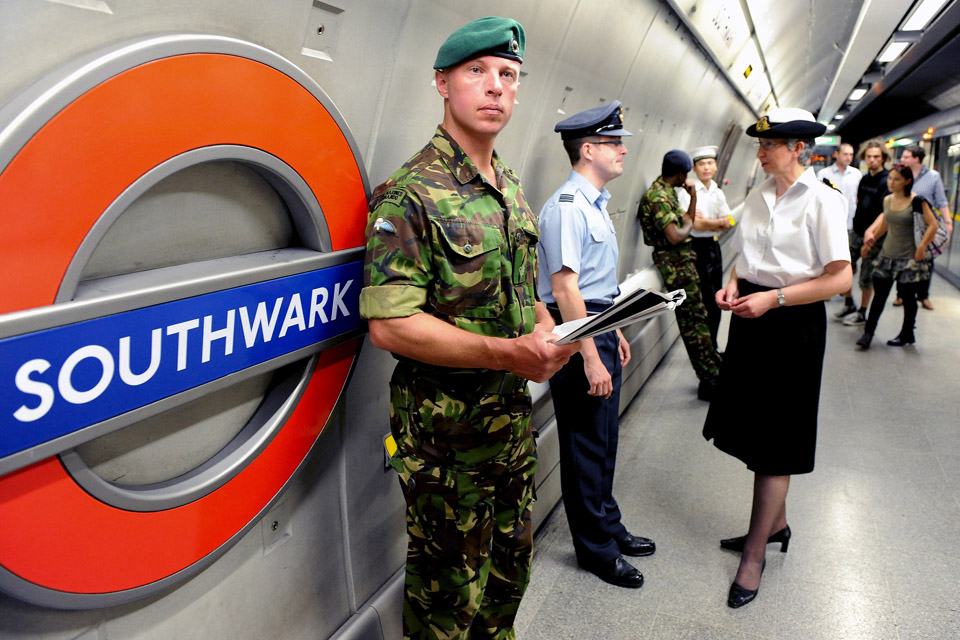Employers have their say on MOD reservists
As the clock counts down to the end of the Future Reserves 2020 Consultation, the Ministry of Defence has reached out to several of the UK's largest employers to pick their brains.
![Reservists from 5th Battalion The Rifles on operations in Afghanistan [Picture: Sergeant Wes Calder RLC, Crown Copyright/MOD 2011]](https://assets.publishing.service.gov.uk/media/5a613bd840f0b60abc66e4cf/s300_Reservists1.jpg)
Reservists from 5th Battalion The Rifles on operations in Afghanistan
The MOD held a workshop on Friday, 11 January, in London where representatives from companies such as Royal Mail, Lloyds Banking Group, Tesco and BAE Systems were encouraged to share their thoughts on a range of subjects that affect their businesses and the reservists they employ.
The delegates discussed subjects including how to minimise the impact that reservists’ mobilisation and deployment has on employers, developing mutual trust through rewards and incentives for employers, developing mutual trust through skills development, and openness and preventing disadvantage to reservists in the workplace.
The workshop was part of the Future Reserves 2020 Consultation which aims to consider what changes are required to the Reserve Forces in order to generate and sustain the numbers and capabilities we need from them to meet our defence requirements.
Those being urged to give us their views on the proposed changes to the Reserve Forces are the reservists themselves, their families, regular Armed Forces personnel, employers and anyone else with an interest in reservists.
The MOD aims to strengthen Defence’s relationship with the employers of reservists in order to maintain a dialogue between all three parties - the employer, the reservist and Defence.
Speaking at the workshop, Defence Secretary Philip Hammond explained the need for better relationships between reservist employers and the MOD:
Our vision is for Reserve Forces integrated with the Regular Forces, forming a larger proportion of an adaptable whole force made up of regulars, reservists, civilian MOD staff and contractors. In the future, reservists will be able to deploy as formed units and sub-units, as well as continuing to serve as individuals with Regular Forces where required.

Reservists from the Army, Navy and Air Force travelling to work in military clothing as part of the annual Uniform to Work Day [Picture: Petty Officer Airman (Photographer) Mez Merrill, Crown Copyright/MOD 2010]
To achieve this vision, our Reserve Forces, the Army Reserve in particular, will need to grow - from a trained strength of around 19,000 today, to 30,000 by 2018.
They will be better equipped, with the same kit as their regular counterparts, and better trained. In some cases, reserve units will become the sole repository of some specialist skills.
All of this will require new relationships - between Defence and reservists, between Defence and employers, and between reservists and their employers.
One of the delegates at the workshop was Carillion’s Services Integrated Management Systems and Technical Compliance Director, Seumas Kerr, who said:
I think that the real challenge is can we attract enough young people who want to do it? We are all getting busier and busier in our work lives, our private lives are more demanding than they have been in the past, so this is something else on top of one’s daily life and the MOD is going to be asking more of reservists.
Overall the workshop was a very helpful day. There was a lot of networking and the MOD put across a view that they wish to do this in partnership with us and that actually sends a very positive message.
The Future Reserves 2020 Consultation closes on Friday 18 January 2013 and can be found here.
Click here to find out about life as a reservist and a Carillion employee.